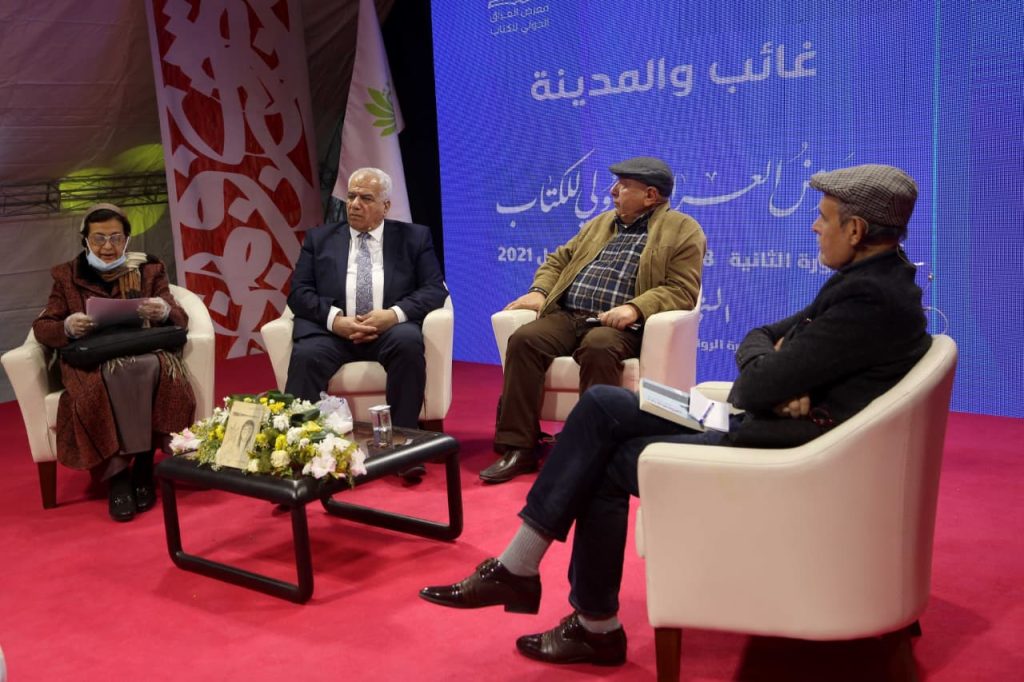
Harith Rasmi Al-Hiti
Photography: Mahmoud Raouf
The seminar hall on the grounds of the Iraq International Book Fair was hosted by Dr. Nadia Al-Azzawi, Dr. Jamal Al-Attabi and Dr. Hussein Al-Hindawi to talk about the absence of Tohme Farman and the city, the seminar, which was moderated by the novelist Hamid Al-Mukhtar and attended by a large number of the public, dealt with testimonies presented by the guests about Ghab Tohme Farman.
Nadia Al-Azzawi addressed in her paper the obsession with the place in the letters of the absent Tohme Farman, she talked about his personal messages that she likened to his novels and stories, which are messages exchanged with his friends, “where the absent seems to be a haunted object in places and their details in a way that reveals the depth of this tendency he has, and the small number that was published of his personal letters represents an important document that the researcher must study as it helps to understand the world of absent Tohme Farman novelist. And understand the methods of employing places in his novels and stories, I was self-security in the publication of more of his letters until he stood on a shocking statement to Professor Yassin Al-Naseer that the full archive of absent was in his possession, but after leaving for Jordan in the nineties presented to one of the Arab researchers to benefit from him in his study of absent, on a promise from him to return it to him, but the researcher broke the promise and dissipated the archive and his messages, and this is another heavy loss added to the losses of our cultural reality always promised loss and squandering documents and neglect archiving”.
Al-Azzawi adds, “The late Mohammed Saeed Al-Sakar published a few of these letters, and they are few of them illuminate useful angles for the student, because his messages often begin with spatial entrances other than the friend, which are places of alienation that are always plagued by disease, alienation, desolation and ugliness.” He wrote in a letter dated 18/1/1968 telling his friend Al-Sakkar:
I received your message while I was bedridden in a hospital that does not suggest a speedy recovery at least, and in Qawoosh inhabited by ten people, and I am between suspicions, guesses, obsessions and thinking about the number of the few years left of my life, and the lobby narrowed until I and your kind letter remained with its wonderful handwriting, and I did not hear the fuss or the noise that rises in the hour of rest and robs me of the pleasure of reading.
Hussein Al-Hindawi spoke about the status of the late Farman by saying, “If the art of the novel is the art of the city par excellence, that is, the art that the people of the city do by writing or narrating the story of its life as their own space as well, the absent Tohme Farman in his realistic narrative style is the novelist of the city par excellence, especially Baghdad, Baghdad, which formed the urban space and the spatial space in which the most important events of his novels took place, especially the palm, the neighbors, the offering, five voices, the pain of Mr. Maarouf, and even his complex novel, which expressed feelings in alienation, She expressed Baghdadi in exile from the son of the city of Baghdad in exile, his novel five voices are five votes for representatives of the sons of the city of Baghdad, and his identity as Baghdadi did not leave even in his long exile and did not love another city as he remained long Baghdadi soul despite his suffering. Even in Moscow, the city where he lived, loved, married and had his son Samir.”
Al-Hindawi continues, “The city also, which is Baghdad, of course, gave his novels almost all their images and material from personalities, human scenes, ways of life, historical traditions, suffering and details of daily and political life and the changes of those traditions, as his novels seem to be a testimony to the characteristics of most of the social, political and cultural transformations that public life has gone through in Baghdad and Iraq in general, especially since World War II, and these dramatic changes are sometimes followed by the absent Tohme Farman closely and searched for them and installed them to form the treasury from which he wove his stories and novels. and his stories.”
Gamal Al-Attabi talked about some glimpses of the absent Tohme Farman, as he says, “When he was a student, he went to Cairo and studied there English literature, and there he also got acquainted with Egyptian writers and writers such as Naguib Mahfouz, Mahmoud Amin Al-Alam and Anis the Great, and his mastery of the English language made him read world literature in English such as Faulkner, Tolstoy and others, and he was also able to write a set of stories published in Egyptian magazines and newspapers.”
Al-Attabi adds, “Farman was in his beginnings a poet who wrote poetry, but he found himself writing the story better than heading to the field of poetry, absent Farman interested in English literature, although he lived in the former Soviet Union and even his translations were translated from English, Farman was absent because of his loneliness and isolation and his departure to work translation and assigning him tasks other than his interests there was weak in learning the Russian language.”
